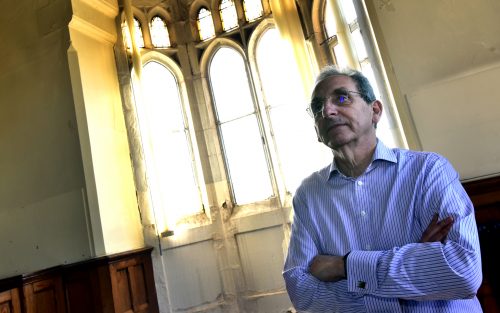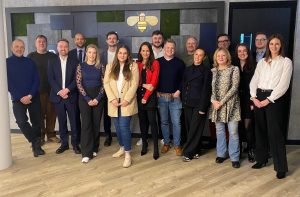Big noise from film industry sounding positive on North West

Oscar-winner Mark Crabtree is a big noise in the film industry. Now he’s aiming to make positive sounds when it comes to creating the digital workforce of the future.
His Burnley-based business AMS Neve is a global leader in digital sound engineering, as witnessed by two Oscars, a Grammy and an Emmy for its work.
Despite that success he has resisted moving the company, which dominates the world of sound in cinema, television and music, to the bright lights of Hollywood.
Now he has revealed plans to transform the former Burnley Grammar school building where he was educated into a thriving, hi-tech hub for digital SMEs and micro-businesses.
Crabtree is investing a seven figure sum of his own money into creating a collaborative workspace to help secure the future digital economy of the town and support the growing Digital Lancashire initiative.
‘The Landmark’ is set to open its doors to the first wave of digital businesses in September.
He says: “The Landmark project is a way to help Burnley grow its digital skills base, and for that not to ‘leak’ out to, say, Manchester but to keep the talent and skill in Burnley.
“In the past, people starting businesses used to need money to buy machinery, hence the grants process. Now they need a laptop, an idea and somewhere other than their kitchen table to work.
“But the point is they want to work with like minds, and having social gathering spaces to encourage each along.”
He adds: “The Landmark will also have allied businesses in situ, a small presence of lawyers and accountants in a move that means those professions will be on hand to assist the young companies grow and flourish.
“The building is absolutely amazing, very atmospheric and lends itself to being a great place to work in an area that has fantastic lifestyle advantages too.”
The Landmark will accommodate around 60 businesses of varying sizes from the start-up micro with one person, through to established digital businesses.
Crabtree’s initiative comes as a pioneering government scheme to boost digital skills has been launched in Lancashire.
The UK’s first Digital Skills Partnership is being piloted by the Department for Digital, Culture, Media and Sport (DCMS) in the county, in partnership with the Lancashire Enterprise Partnership (LEP’s) Skills and Employment Hub.
The innovative approach will help identify gaps in digital skills provision, encourage partners to work strategically together to address them and attract investment from outside bodies. The aim is to have greater impact and be more effective and sustainable over the long term.
Google, TSB and Lloyds have all agreed to give more support to digital skills training in Lancashire through the partnership. Google has committed to working with local partners to train 1,000 people and businesses through its Google Digital Garage programme.
Director of the Lancashire Skills and Employment Hub, Dr Michele Lawty-Jones, says: “We have worked with local partners to identify skills and employment opportunities across Lancashire and digital has been identified as a priority sector.
“We are now working across the county to create a pipeline of new talent, support businesses, and establish an inclusive approach to workforce development.
“This collaboration between local and national partners means we can do so much more to inspire our next generation and address the current digital skills gap.”
The creative economy in Lancashire –dominated by digital, creative, software and computer science businesses – employs 36,000 people and is worth £1.3bn in GVA.
Yet 57 per cent of fast-growing businesses in a survey said they struggled to find technically capable staff with advanced IT or software skills. Provision of computer sciences at higher-education level also lags behind the national average.
Leon Calverley is managing director of Burnley-based digital agency Door4. Like Crabtree he is a native of the town.
His business has a staff of 19 and he says recruitment is a challenge. However, he adds: “We are creating the right environment for people to want to come to work for us, it is about making ourselves as good place to work as we can.”
Anthony Chesworth is founder Preston-based e-commerce firm EKM, and he has invested heavily in stylish and vibrant new offices in the city, aimed at attracting young workers away from the bright lights of its neighbours. Like Calverley he says: “We want a creative working environment that will attract people.”
He says the recruitment challenge comes from Manchester and all it can offer and he adds: “The biggest thing that holds us back is talent, getting the right people in.”
Though he believes that is finally beginning to change. The business has around 80 people based in its new offices and it continues to grow, with £1.4m a day in revenue going through its systems.
If we were based in London we would have failed
Dominic McGregor, co-founder of The Social Chain Group, is in no doubt about the importance of basing the business in the North West.
He says: “I can safely say that if we continued to run the business from London we would had failed.”
The marketing agency began life in the capital. “We began life working from our investors office in Hammersmith, we had a bank of six chairs in the corner of a room,” he recalls.
However, once the team began to grow the business quickly made the decision to move up to Manchester. Four of the founding team members were from the North West.
McGregor says the move gave the business the space and the environment to build the vision that they had for the business.
He says: “As we expanded the team we found recruitment pretty straight forward. We took the top talent from MMU, UOM and UoS which built the core foundation of our team.
“Manchester has provided us a great setting for our business to grow; we’ve had a lot of support from the local business community while the press and media have always championed us within the area.”
He adds: “As we have continued to grow, we initial found senior talent easy to come back. We built a large senior team from other agencies and media owners within the city.
“We are aware that talent is finite within the region. We know that we need to develop our own pipeline of future industry leaders.
“Our plans are to invest in an academy where we can train apprentices to our standard and reintroduce them into the local business community.
“Beyond that we also have ambitions to build our own campus where we have all the facilities we require. The north will always be our home and where we define our values.”
Paul Billington says The Landing is at the start of a new 10-year road map. Its aim is to provide support in the building and growth of tech businesses.
The MediaCity workspace in Salford is currently home to more than 110 companies and more than 550 people and its focus is firmly on tech growth. Collaboration plays a big part in that.
Billington, commercial director, says: “People are still coming up with innovation and ideas, there is a strong pipeline and we have to turn away more businesses than we accept.
“We are building an environment where, if you are a tech business, you have a better chance than if you were anywhere else.”
James Doggart, chief executive of Manchester-based Cloud Solutions, says being based in the city is both a challenge and an advantage. He says: “One of the challenges we have is finding the right skills and it is an issue. It is probably our biggest inhibitor in terms of growth.
“We’re having to get creative in terms of graduates and developing graduate schemes to be able to invest in the long term.”
He adds: “Having said that, Manchester does hold advantages. There is a good strong digital hub here.
Doug Ward, founder of start-up tech company Telecom, based in the Northern Quarter, believes there is no better place for his business to be.
Its aim is is to change the country’s internet from the third worst in Europe to the best.
And Ward says the talent from the city’s universities and the spirit of collaborative working that exists are major plus-points in the journey towards that.
He adds: “It is very clear to us, having studied tech clusters around the world, that Manchester has got all the data points to be a top five European tech city.”
Paul Mann is a partner in Squire Patton Boggs’ corporate team based in the North and heads its UK private equity team. He says skills and recruitment are challenges for the sector, but it is not alone in facing them
He adds: “Brexit and the impact that might have on recruitment is an added worry for many businesses.”









